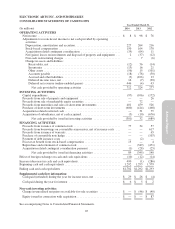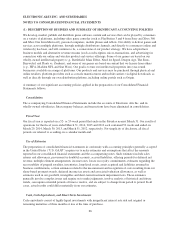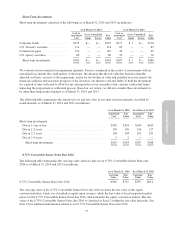Electronic Arts 2014 Annual Report Download - page 139
Download and view the complete annual report
Please find page 139 of the 2014 Electronic Arts annual report below. You can navigate through the pages in the report by either clicking on the pages listed below, or by using the keyword search tool below to find specific information within the annual report.
Annual Report
Service and other revenue. Our service revenue includes revenue recognized from time-based subscriptions and
games or related content that requires our hosting support in order to utilize the game or related content (i.e., can
only be played with an Internet connection). This includes (1) entitlements to content that are accessed through
hosting services (e.g., micro-transactions for Internet-based, social network and mobile games), (2) massively
multi-player online (“MMO”) games (both software game and subscription sales), (3) subscriptions for our
Battlefield Premium and Pogo-branded online game services, and (4) allocated service revenue from sales of
software games with an online service element (i.e., “matchmaking” service). Our other revenue includes
advertising and non-software licensing revenue.
With respect to the allocated service revenue from sales of software games with a matchmaking service
mentioned above, our allocation of proceeds between product and service revenue for presentation purposes is
based on management’s best estimate of the selling price of the matchmaking service with the residual value
allocated to product revenue. Our estimate of the selling price of the matchmaking service is comprised of
several factors including, but not limited to, prior selling prices for the matchmaking service, prices charged
separately by other third-party vendors for similar service offerings, and a cost-plus-margin approach. We review
the estimated selling price of the online matchmaking service on a regular basis and use this methodology
consistently to allocate revenue between product and service for software game sales with a matchmaking
service.
We evaluate and recognize revenue when all four of the following criteria are met:
•Evidence of an arrangement. Evidence of an agreement with the customer that reflects the terms and
conditions to deliver the related products or services must be present.
•Fixed or determinable fee. If a portion of the arrangement fee is not fixed or determinable, we
recognize revenue as the amount becomes fixed or determinable.
•Collection is deemed probable. Collection is deemed probable if we expect the customer to be able to
pay amounts under the arrangement as those amounts become due. If we determine that collection is
not probable as the amounts become due, we generally conclude that collection becomes probable upon
cash collection.
•Delivery. Delivery is considered to occur when a product is shipped and the risk of loss and rewards of
ownership have transferred to the customer. For digital downloads, delivery is considered to occur
when the software is made available to the customer for download. For services and other, delivery is
generally considered to occur as the service is delivered, which is determined based on the underlying
service obligation.
Online-Enabled Games
The majority of our software games can be connected to the Internet whereby a consumer may be able to
download unspecified content or updates on a when-and-if-available basis (“unspecified updates”) for use with
the original game software. In addition, we may also offer an online matchmaking service that permits consumers
to play against each other via the Internet without a separate fee. U.S. GAAP requires us to account for the
consumer’s right to receive unspecified updates or the matchmaking service for no additional fee as a “bundled”
sale, or multiple-element arrangement.
We have an established historical pattern of providing unspecified updates to online-enabled games (e.g., player
roster updates to Madden NFL 25) at no additional charge to the consumer. We do not have vendor-specific
objective evidence of fair value (“VSOE”) for these unspecified updates, and thus, as required by U.S. GAAP,
we recognize revenue from the sale of these online-enabled games over the period we expect to offer the
unspecified updates to the consumer (“estimated offering period”).
Prior to July 1, 2013, for most sales we estimated the offering period to be six months and recognized revenue
over this period in the month after delivery. During the three month ended June 30, 2013, we completed our
annual evaluation of the estimated offering period and noted that generally, consumers are playing our games
69
























